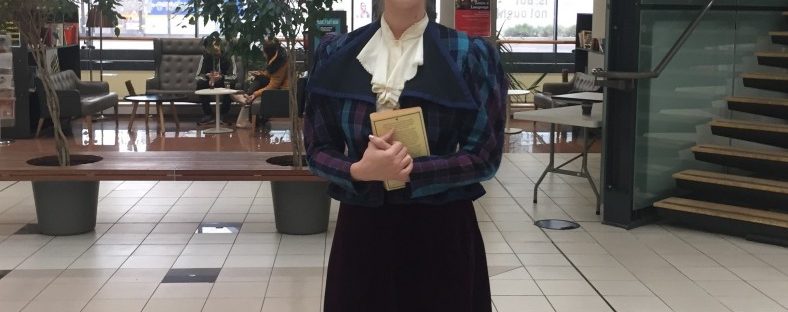Suffragist Ada Nield Chew remembered at Manchester performance marking the 100th anniversary of voting rights for women
- Factory girl protestor Ada Neild Chew was dismissed from her job in 1894 for writing a series of inflammatory letters to her local paper
- A local youth project run by MMU lecturers uses her story to highlight the fight for universal suffrage – and tackle political apathy among young people
Suffragist Ada Neild Chew made an appearance at Manchester Metropolitan University this morning in a pop-up protest marking the centenary of The Representation Of The People Act.
Ada (played by Jess Harris, above) delivered a stirring performance of one of her 1984 letters to The Crewe Chronicle demanding a living wage for factory girls.
Great to see so many women of colour also celebrating 100 years since women got the vote in UK. Some women are still striving for what we may take for granted. Make your voice, efforts and legacy count, speak up speak out. @BBCRadioManc #suffcity @kc_ pic.twitter.com/pYIUqGcyKX
— Dr Erinma Bell MBE (@ErinmaBell) February 6, 2018
The letters resulted in her being dismissed from Crompton Brothers’ clothing factory in the summer of 1894 for inciting her female co-workers to make demands for better pay and conditions. Ada went on to build a career in political activism and literature. She was also a vocal member of the NUWSS, campaigning for Votes For Women.
The performance was organised by Dr Kirsty Bunting and Orlagh McCabe of MMU as part of their work with Local Youth Engagement Crewe (LYEC) around the 100th anniversary of votes for women.
In organising the event, Dr Bunting felt that Ada’s story was an important one to remember. She said: “We felt it was really important to remind people that there were Suffragists – not Suffragettes – who were peaceful protesters campaigning for rights for women way back in the 1890s.”
Kirsty and Orlagh are the founders of LYEC and organise workshops with young people to encourage engagement with politics. The workshops use Ada Neild Chew’s letters to highlight the importance of voting, and the fight for this fundamental right which now so many young people do not use. Alongside the performance in MMU’s Geoffrey Manton Atrium today, the organisation showcased the work of schoolchildren who had read Ada’s letters and responded to them in poetry and art.
So far the project has worked with more than 500 young people in Crewe. But the work is not likely to stop anytime soon. LYEC is now working towards the centenary of the 1928 enfranchisement of all women on equal terms with men.


